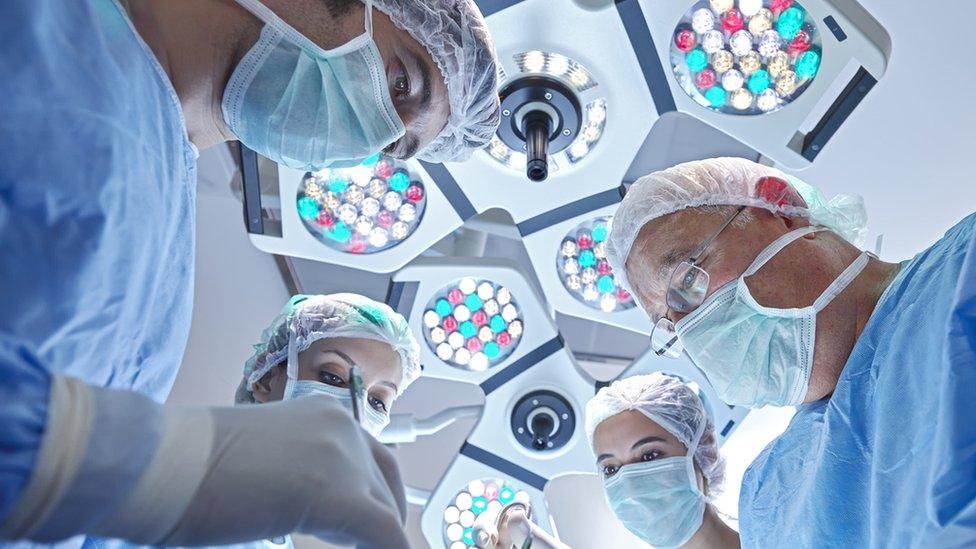Hospitals to delay non-urgent operations
- Published
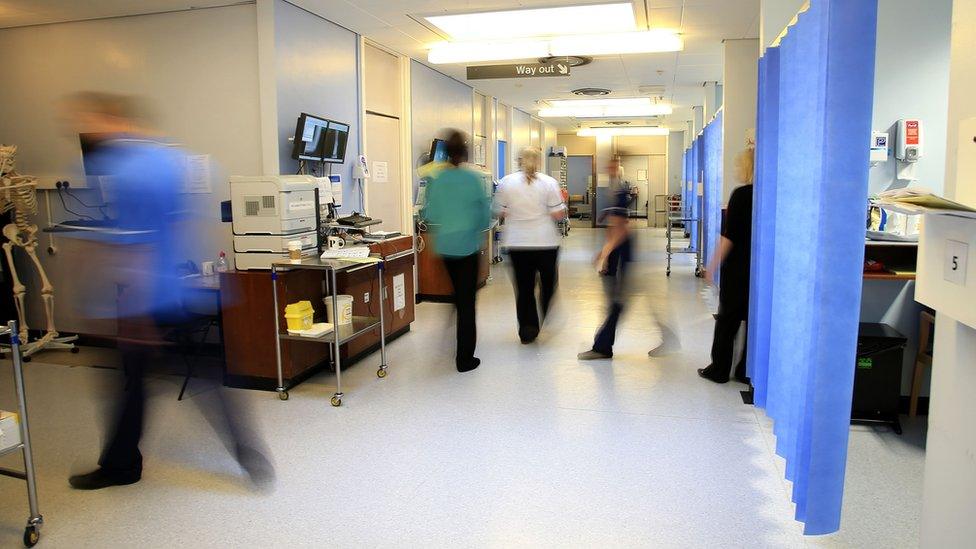
Tens of thousands of non-urgent NHS operations and procedures in England may be deferred until 31 January, due to winter pressures.
Officials also told hospitals to delay routine outpatient appointments to concentrate on emergency care.
Separately, a doctor apologised on Twitter for "third world conditions" in the hospital where he works in Stoke.
NHS England's acute care director said hospitals were being given the "time and space" to manage January pressures.
Officials reiterated that cancer operations and time-critical procedures should go ahead as planned.
The advice comes as Milton Keynes University Hospital is telling people only to attend for emergency treatment.
BBC reporter Dominic Johnson said Nottingham's Queen's Medical Centre is asking patients to avoid its emergency department as it is on black alert, after seeing 140 patients at its peak on Tuesday evening.
He adds 80-100 patients is considered "very busy".
Allow X content?
This article contains content provided by X. We ask for your permission before anything is loaded, as they may be using cookies and other technologies. You may want to read X’s cookie policy, external and privacy policy, external before accepting. To view this content choose ‘accept and continue’.
Two ambulance trusts in England, east and north-east, say they are on the highest alert.
NHS England's National Emergency Pressures Panel, which met on Tuesday, said it had extended the deadline for deferral of all non-urgent inpatient elective care - such as hip or knee replacements - to 31 January, to free up capacity for the sickest of patients.
NHS England also gave hospitals the green light to put patients in mixed sex wards.
Winter pressures
Director of acute care Professor Keith Willett said that the delay of non-urgent operations was not a crisis, and added the NHS in England was reacting to concerns from doctors and nurses over a rise in flu incidents, as well as predicted cold weather.
He said: "With the incidents of flu rising in the community and in our hospitals, and the pressures that we always see in the first few weeks of January... that it's important we give the hospitals time and space to manage the demand that we anticipate will come through."
Each year the service comes under increased pressure in the winter, largely as a result of an increase in certain illnesses over this period, such as flu.
It is too early to judge how bad this year's pressures are compared with previous years.
The NHS does release regular statistics, but these are not real-time - meaning there is always a lag of a week or two to learn the full picture.
Milton Keynes University Hospital said it was facing pressure as a result of "very high numbers of patients seeking emergency medical care".
It said the hospital had opened an "unprecedented number of escalation [extra] beds" in order to provide care for acutely unwell patients and warned that patients attending its emergency department would be treated in order of clinical priority.
The hospital's chief executive, Prof Joe Harrison, said: "We are seeing very high numbers of very sick patients in the emergency department and fewer patients being able to be discharged - many because they also remain in need of acute care.
"I would urge people to avoid the hospital's emergency department unless it is a genuine emergency.
"Staff are working under incredible pressure to look after the patients in our care. I cannot overstate that. We are doing our best in extraordinarily difficult circumstances."

Analysis:
BBC News health editor Hugh Pym
The NHS is always under great pressure in the New Year - with some patients holding off over the festive season before going into A&E.
Hospitals have planned intensively for the higher anticipated demand over winter.
But the service seems under even more strain than previous years.
The fact that NHS England has felt the need to call for further restrictions on non-urgent surgery and outpatient appointments underlines concerns at the highest level.
It has decided to give the green light to hospitals to put patients in mixed sex wards if they have to.
NHS England notes a higher number of flu cases and can only hope that its own warnings about a flu outbreak don't materialise.

'Severe and sustained pressure'
Meanwhile, Dr Richard Fawcett, whose Twitter profile lists him as a consultant at University Hospitals of North Midlands NHS Trust, apologised via Twitter for "third world conditions" in his hospital department.
Allow X content?
This article contains content provided by X. We ask for your permission before anything is loaded, as they may be using cookies and other technologies. You may want to read X’s cookie policy, external and privacy policy, external before accepting. To view this content choose ‘accept and continue’.
The hospital trust responded by saying it had been under "severe and sustained pressure over the Christmas period" and this had "continued into the new year".
The trust's medical director, Dr John Oxtoby, added: "Our staff want the very best for our patients and at times they find the situation frustrating, which can be reflected on social media.
"However, we are a leading trauma, stroke and cardiac centre and have been regularly praised by external independent commentators for the quality of compassionate care provided at our hospitals despite all our pressures."
Ambulance services in the north-east and east of England said they had reached their highest operational alert level - number four.
The North East Ambulance Service said it had been hit by "unprecedented levels of demand" over the Christmas and new year period.
It said it was "asking some patients, where appropriate, if they have alternative transport options, such as a family member".
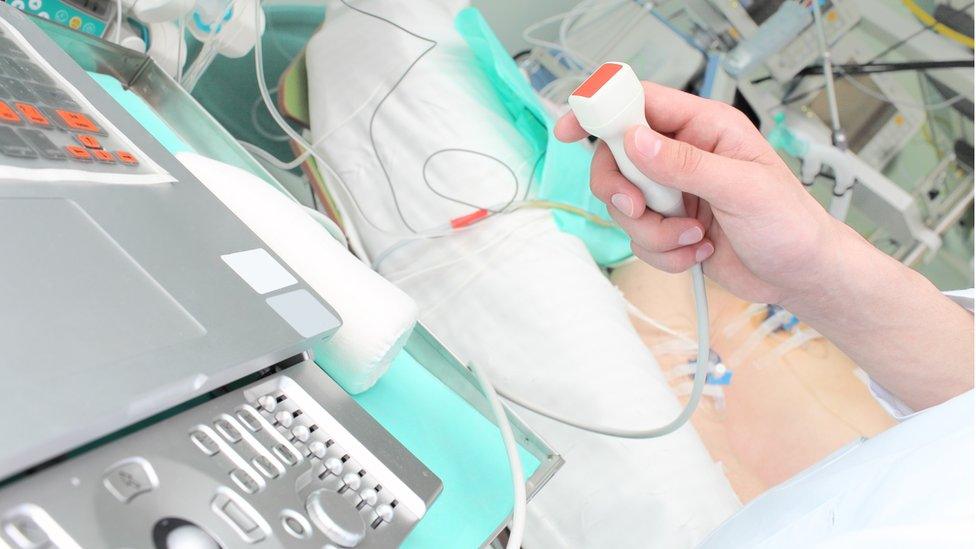
Between 23 December and 1 January, it took more than 40,000 NHS 111 calls and more than 16,000 999 calls - compared to around 28,000 NHS 111 calls and 15,000 999 calls in the same period last year.
It advised members of the public to consult a GP, pharmacist, local walk-in centre or to call NHS 111 if they did not require emergency care.
A spokesman for the Scottish Ambulance Service said it had been at level three since Friday.
A spokesman added: "We are experiencing a high call demand, but that is not unusual at this time of year."
A spokesman for the Northern Ireland Ambulance Service said Northern Ireland used a different system.
There are four major hospitals served by the ambulance service and GP and 999 calls are being redirected away from the Ulster Hospital in Dundonald, County Down to the other three major hospitals, which are currently operating normally.
- Published13 June 2019
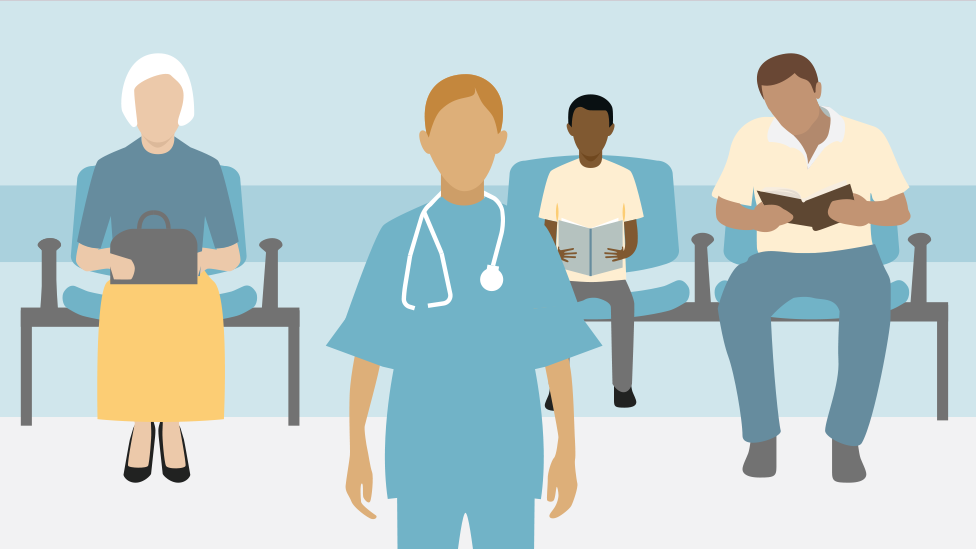
- Published26 December 2017
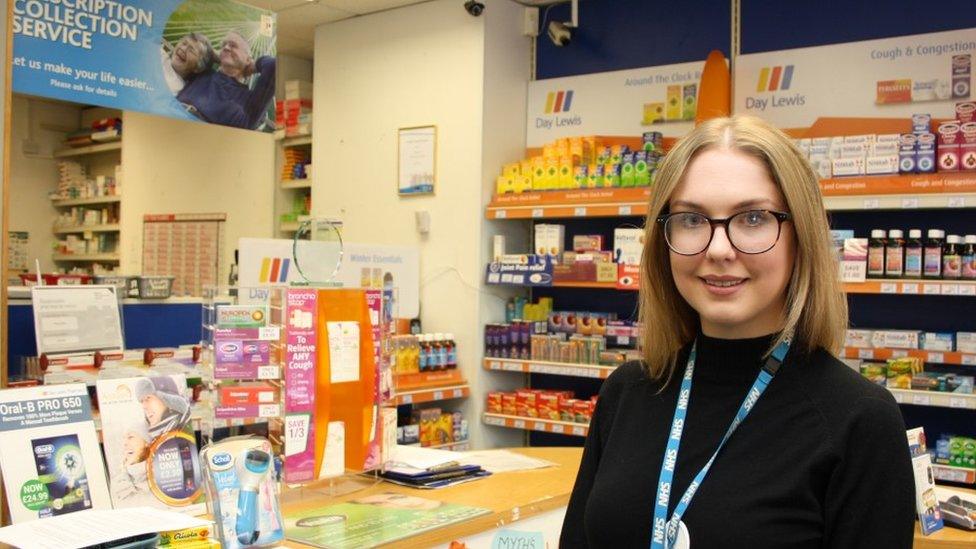
- Published21 December 2017
